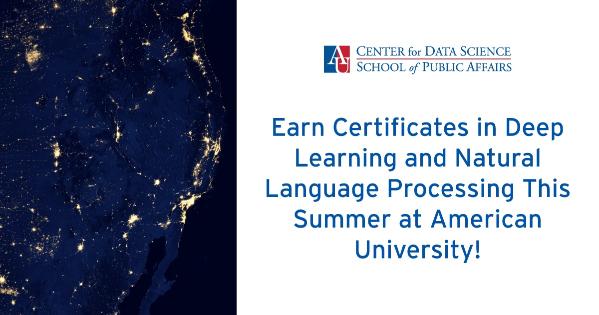SPA Center for Data Science Offers Certificates in Deep Learning and Natural Language Processing

Recent advances in natural language processing (NLP) and deep-learning technologies have intensified the national conversation about their applications and challenges. Considering this evolving paradigm, the SPA Center for Data Science now offers two certificate programs targeted to experienced professionals looking to remain innovative, competitive, and technically strong in the areas of NLP, neural networks, and deep learning.
“Machine learning and AI are moving at unprecedented speed, producing new knowledge on a daily basis,” said center Director and SPA Distinguished Professor of Government (also Distinguished Professor of Math and Statistics) Jeff Gill. “It is becoming increasingly hard to remain on the cutting edge of algorithms, theory, and tools. There is a need for practicing data scientists and related professionals in industry, government, and academia to get up-to-date training in the latest machine learning tools without having to commit to a degree program or semester-long course.”
Certificates are available in deep learning and natural language processing. The workshops, taught by AU Assistant Professor of Mathematics & Statistics Zois Boukouvalas, will be hybrid, fully interactive, and small, featuring weekly lab assignments. Moreover, all classes will be scheduled for evenings (during summer session only), enabling maximum flexibility for mid-career professionals.
“These two courses offer a brief but deep exposure to current machine learning approaches, including natural language processing,” said Boukouvalas.
The deep learning workshop covers advances in machine learning and artificial intelligence (AI) that imitate the patterns by which humans gain knowledge, and their recognized applications to computer vision, time series, and text. It will discuss multi-layer neural networks, convolutional neural networks, and generative adversarial neural networks using modern libraries in Python.
The NLP workshop, which also pulls from Python, examines methods for analyzing textual datasets. Participants will gain familiarity with the application of NLP concepts to tasks such as text classification, chatbots, and topic modeling.
SPA also offers undergraduate and graduate degrees in data science, a natural complement to the study of public affairs.
“The bulk of data sciences and AI applications are about studying human behavior: socially, commercially, and politically,” said Gill. “This fits perfectly with the SPA mission, since these tools affect many aspects of modern life, especially public affairs and public discourse.”
Interested applicants can fill out this form to learn more about these classes or register.
